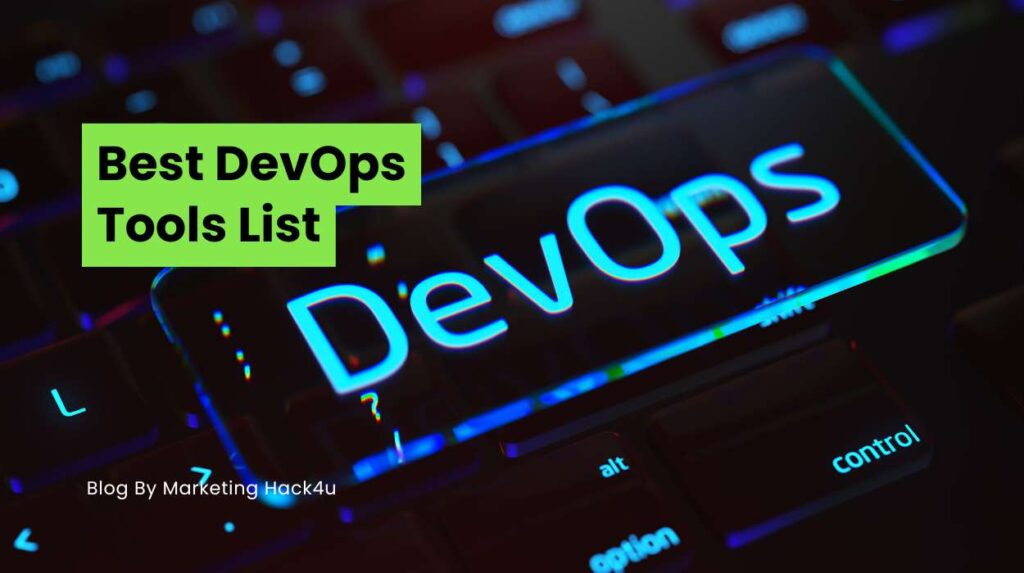Are you searching for the ultimate DevOps tools to boost your team’s productivity in 2024? With the evolution of the digital world and technology, it is crucial to have the right set of tools for elevating your DevOps game. That’s why we are here to help. In this article, we will learn what DevOps is and also have a walkthrough of the 10 best DevOps tools in 2024, helping you choose the most suitable tool for your needs.
What are DevOps and DevOps Tools?
DevOps, derived from two words “development” and “operations,” is a set of practices and methods that unify software development and IT operation processes. The primary motive behind the birth of this practice is to reduce the time of the software development lifecycle, from coding and testing to implementation and maintenance. In this practice, the development and operation team collaborates to improve the software quality and elevate the project outcomes.
Now, this is where the DevOps tools come into the picture. These tools facilitate the implementation of DevOps practices by providing features to automate processes, improve collaboration, maintain transparency, and manage infrastructure. By leveraging DevOps tools, companies can streamline the respective teams’ efforts, do regular follow-ups, and enhance the efficiency of this process.
Without further ado, let’s dive into the list of the 10 best DevOps tools in 2024.
10 Best DevOps Tools List in 2024
1. Ansible

Ansible is a configuration management DevOps tool that allows you to automate tasks, deploy applications, and manage configuration. This open-source IT automation platform is easy to use, making it suitable for beginners and advanced users. It is mostly used by automation architects, automation developers, and automation admins and operations teams.
Key Features:
- Configuration management
- Application deployment
- Orchestration
- Security and Compliance
- Cloud Provisioning
- Modules, plugins, inventories, playbooks, and APIs
- Automation
- Rich reporting and observability metrics
- Define, operate, and delegate automation.
- Internal developer portal
Pricing: Please contact their sales team to know about the pricing plans.
Website: https://www.ansible.com/
2. Docker
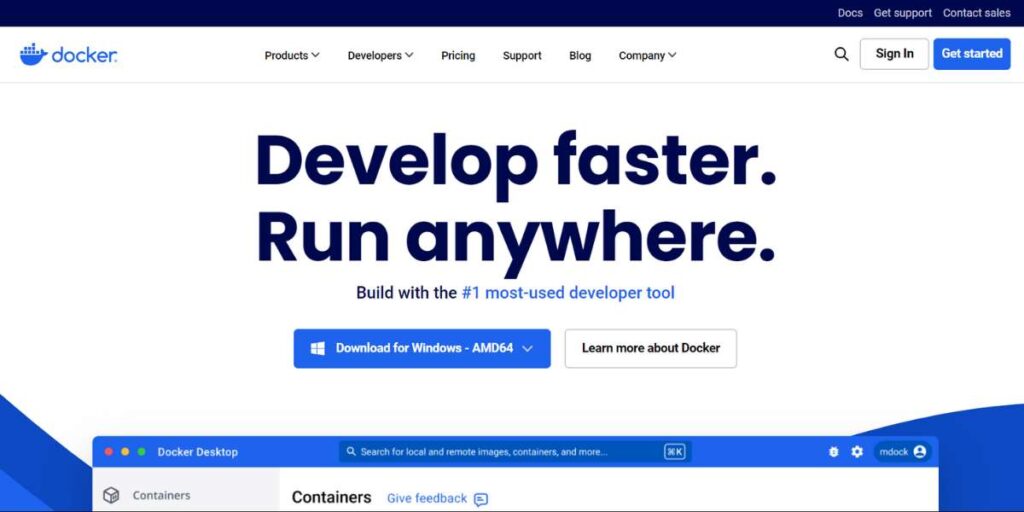
Docker is one of the best DevOps tools that helps developers build, share, run, and verify applications anywhere. This lightweight tool allows developing applications, exchanging container images, and collaborating with users and team members. Docker provides development tools, services, trusted content, and automation. It has 20M+ monthly developers, 7M+ applications, and 20B+ monthly image pulls.
Key Features:
- Docker Desktop (quick to set up, simple to maintain, secure, and easy to scale)
- Docker Hub (100,000+ container images and share responses publicly or privately)
- Docker Desktop
- Docker Hub
- Docker Scout (centralized views and recommended workflows)
- Docker Build Cloud
- Command Line Interface
- IDE Extensions
- Container
- Runtime
- Docker
- Extensions
- Trusted Open
- Source Content
- Secure Software
- Supply Chain
- Product Roadmap
Pricing:
- Personal: $0
- Pro: $7/month
- Team: $11/month
- Business: $24/month (yearly plan)
Website: https://www.docker.com/
3. Gitlab
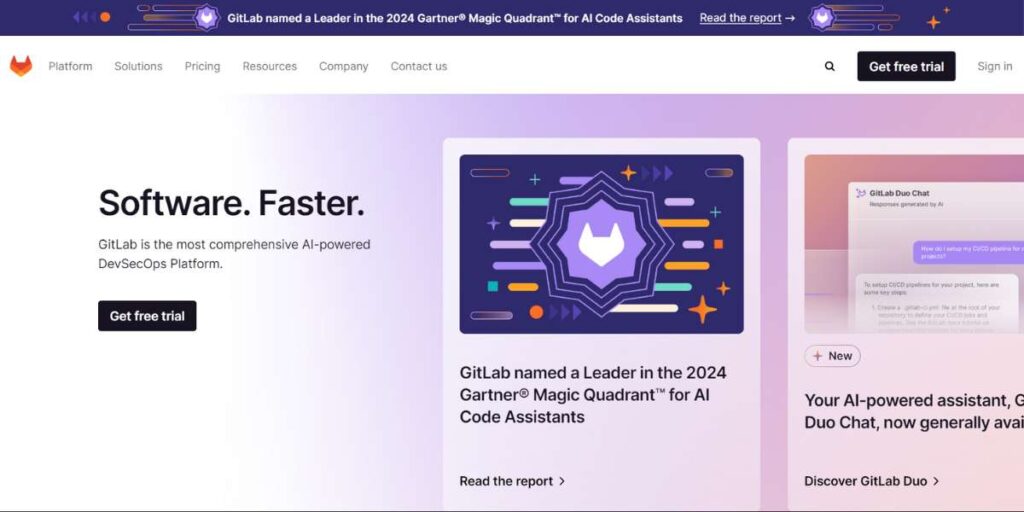
Gitlab is an all-in-one platform, designed to empower development, security, and operations teams. With AI-powered workflow, Gitlab boosts efficiency and reduces cycle times of every phase of the software development life cycle, from planning and coding to testing and monitoring.
Key Features:
- Source-code management
- Continuous integration
- Planning
- AI-powered workflow
- Security and Compliance
- Continuous delivery
- Artifact registry
- Observability
- Security automation
- Integration
Pricing:
- Free: $0/month
- Premium: $29/month
- Ultimate: Custom price
- GitLab Duo: $19/month
- GitLab Duo Enterprise: $39/month
- Enterprise Agile Planning: $15/month
Website: https://about.gitlab.com/
4. Kubernetes
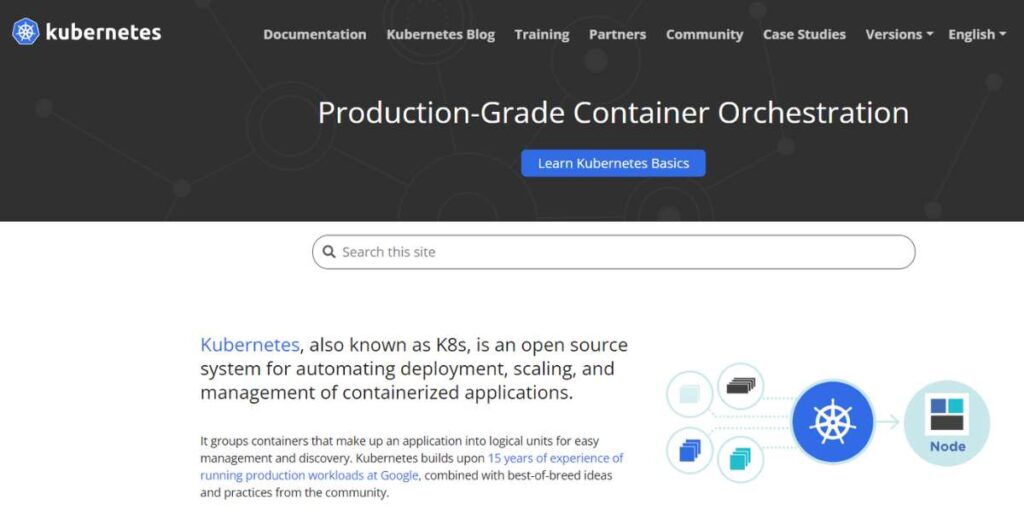
Kubernetes is an open-source and production-grade container orchestration DevOps tool used to automate the deployment, scaling, and management of containerized applications. It gives you the freedom to take advantage of on-premises, hybrid, or public cloud infrastructure. A must-have tool for modern DevOps teams Kubernetes allows you to build resilient, microservice-based applications.
Key Features:
- Automated rollouts and rollbacks
- Service discovery and load balancing
- Self-healing
- Storage orchestration
- Secret and configuration management
- Automatic bin packing
- Run anywhere: on-premise, hybrid, or public cloud
- Batch execution
- Horizontal scaling
- IPv4/IPv6 dual-stack
- Designed for extensibility
Pricing:
To know about their pricing plans, please get in touch with the Kubernetes sales team.
Website: https://kubernetes.io/
5. Jenkins

Jenkins is a leading open-source automation server for automating continuous integration and delivery. It provides hundreds of plugins that can be integrated with any DevOps tools to support building, deploying, and automating any project. The tool is extensible and can easily distribute work across multiple machines to build and test across multiple platforms faster.
Key Features:
- Continuous integration and continuous delivery
- Easy installation and configuration
- View builds and branches of code through a simple, clean GUI.
- 400+ Plugins
- Extensible
- Distributed
Pricing:
Jenkins is a free and open-source tool.
Website: https://www.jenkins.io/
6. Prometheus
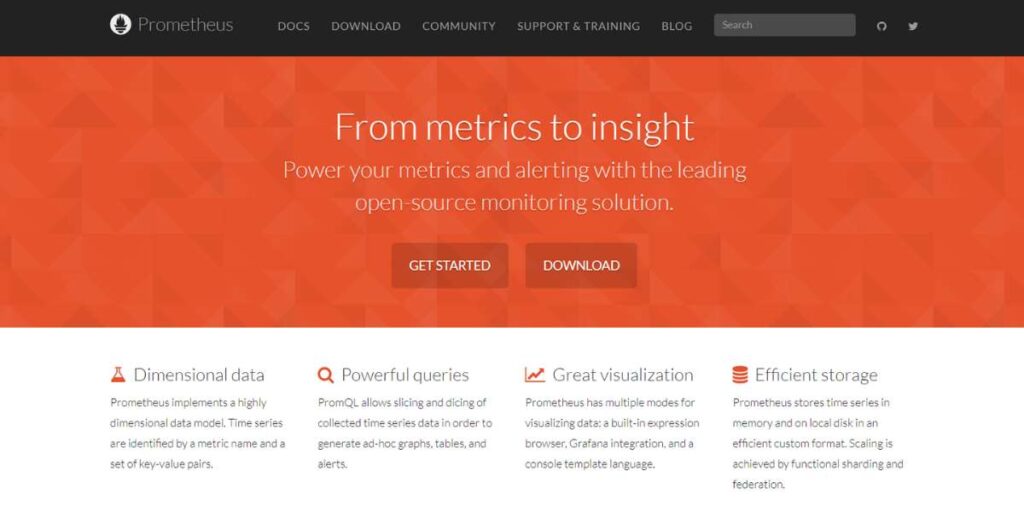
Prometheus is an open-source and community-driven DevOps tool to monitor complex software systems. The tool allows you to collect metrics and gain valuable insights to assess the health and performance of the application’s infrastructure, including containers, microservices, and cloud-based environments. It also supports container monitoring and creates alerts based on time series data.
Key Features:
- Dimensional data
- Powerful queries
- Great visualization
- Efficient storage
- Simple operation
- Precise alerting
- Many client libraries and integrations
- Powerful reporting
- Scaling and client libraries
Pricing:
It is an open-source and community-driven DevOps tool.
Website: https://prometheus.io/
7. Terraform
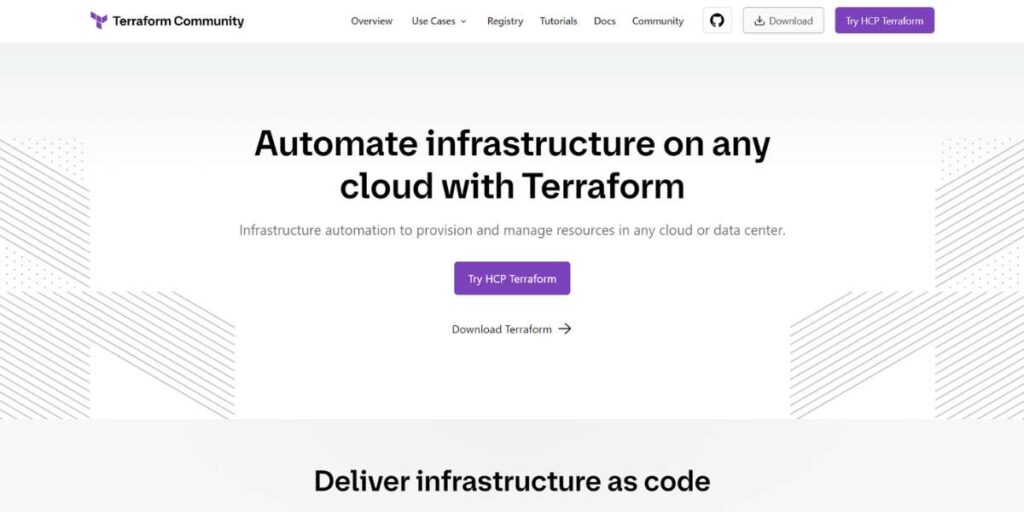
Terraform is one of the best DevOps tools that automate infrastructure workflows on any cloud or data center to provision, collaborate, reuse, compose, and manage resources. This covers high-level elements like DNS records and SaaS services and low-level elements like compute instances, storage, and networking. With Terraform, you can establish guardrails for security, compliance, and cost management through role-based access controls, policy enforcement, and audit.
Key Features:
- Remote state storage
- Team collaboration
- Role-based access controls
- Flexible workflows
- Audit logs
- Config-driven import
- Private registry
- Drift detection
- Policy as code
- Explorer for workspace visibility
- Integrate with external tools
- Unify on the HashiCorp suite
- API and CI/CD integrations
- Private datacenter connectivity
- Continuous validation
- End-to-end automation
Pricing:
- Free: Up to 500 resources per month
- HCP Standard: $0.00014 per hour per resource
- HCP Plus: Custom price
- Enterprise: Custom price
Website: https://www.terraform.io/
8. Chef

Chef is an open-source DevOps tool that configures, deploys, and manages your entire application infrastructure in a secure and compliant way. This automation and configuration management tool enables users to express infrastructure, security policies, and application life cycles as code. It can be easily integrated with cloud platforms like Amazon AWS, MS Azure, GCP, etc.
Key Features:
- Configuration management
- Application delivery
- Edge management
- Chef courier
- App infrastructure compliance
- Cloud security and compliance
- Desktop
- Premium content
- Integration
Pricing:
You should contact the chef’s sales team directly to know the pricing details.
Website: https://www.chef.io/
9. Raygun
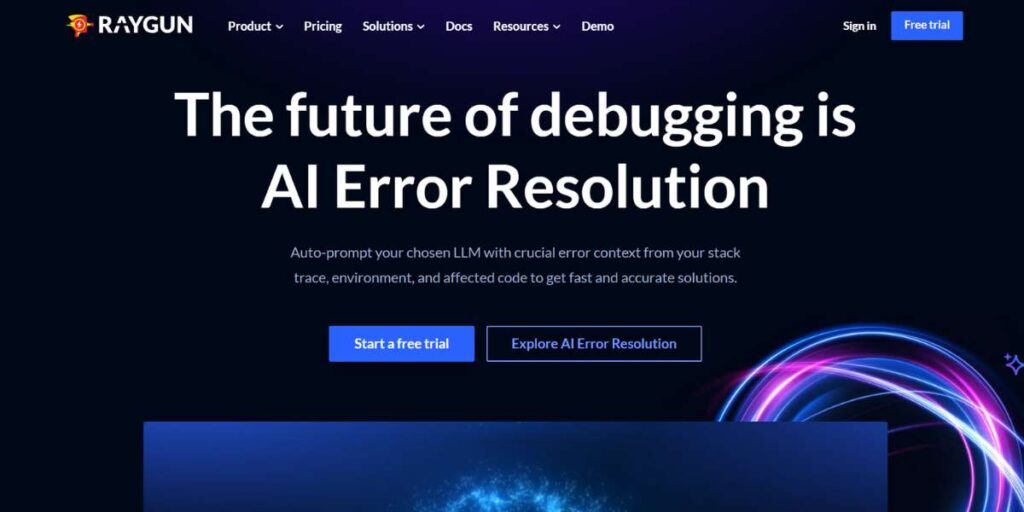
Raygun is a cloud-based and AI-driven platform that monitors your web and mobile applications for errors, crashes, freezes, and performance. With crash monitoring, you can reduce the errors that impact the checkout process, cut down MTR, increase revenue, and accelerate your deployment frequency. It also supports native integrations with Slack, Github, Jira, Bitbucket, and more of your favorite tools.
Key Features:
- Error monitoring and crash reporting
- Real user monitoring
- Application performance monitoring
- AI error resolution
- Crash reporting for Shopify
- Alerting
- Crash-free users
- Dashboards
- Raygun for.NET Aspire
- Integrations
- Customer experience monitoring
- Deployment tracking
- Core web vitals
- Content security policy
- API specifications
Pricing:
- Crash Reporting:
- Basic: $60/month
- Team: $120/month
- Business: $600/month
- Enterprise: Custom price
- Real User Monitoring:
- Basic: $120/month
- Team: $240/month
- Business: $1200/month
- Enterprise: Custom price
- Application Performance Monitoring:
- Basic: $120/month
- Team: $240/month
- Business: $1200/month
- Enterprise: Custom price
Website: https://raygun.com/
10. Bamboo
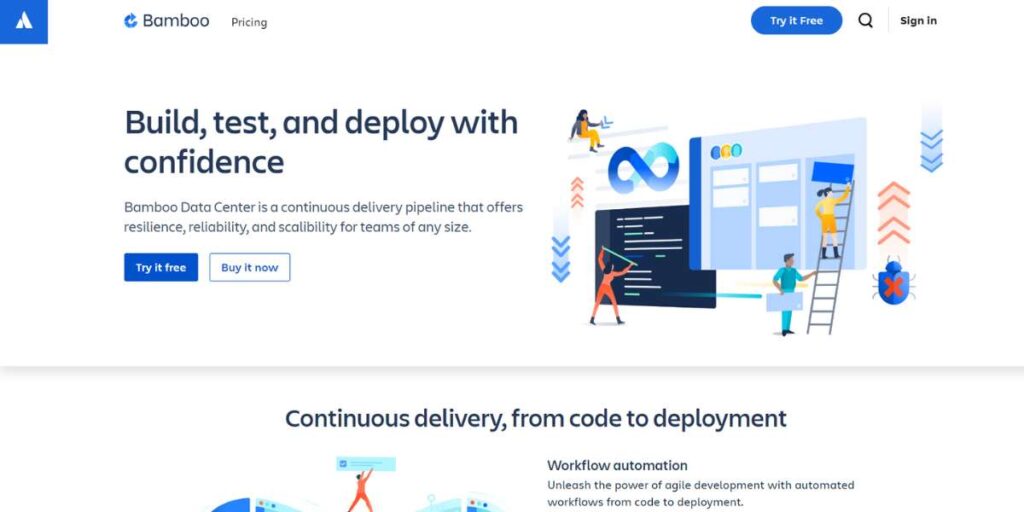
Last but not least, Bamboo Data Center is a continuous deployment automation DevOps tool that allows you to build, test, and deploy in a single workflow with confidence. The tool offers resilience, reliability, and scalability for teams of any size. You can also create multi-stage build plans and set up triggers to start builds upon commits with Bamboo.
Key Features:
- Workflow automation
- Built-in disaster recovery
- Scale with confidence
- Development workflow
- Continuous delivery
- Incident investigation
Pricing:
- Data Center:
- I Remote Agent: USD 1200
- 5 Remote Agents: USD 3200
- 10 Remote Agents: USD 5840
- 25 Remote Agents: USD 11600
Website: https://www.atlassian.com/software/bamboo
Read More Tools Articles:
End Note
This article was about the 10 best DevOps tools in 2024 that can play a crucial role in any company’s DevOps process. The key to successful DevOps is to find the right tool that can foster collaboration and automation, empowering the teams to focus on innovation and software success. As DevOps transforms the software landscape, becoming proficient with these DevOps tools will ensure you stay at the forefront.
Frequently Asked Questions (FAQs)
What features should we look for in DevOps tools?
Before choosing DevOps tools, you should consider the following given features:
- Application and technology infrastructure
- Developer process integration
- Open and broad integration
- Ease of use
- Automated testing
- Serverless computing
- Continuous integration and delivery
- Collaboration
- Scalability
- Real-time monitoring and analytics
What are the benefits of using DevOps tools?
The following are some benefits of using DevOps tools:
- Faster deployments
- Improved collaboration
- Enhanced quality, efficiency, and reliability
- Automated workflows
- Better software quality
- Scalability and flexibility
- Increased security
- Continuous feedback and improvement
Which DevOps tools are best for performance monitoring, testing, and configuration management?
- DevOps tools for performance monitoring:
- Prometheus
- Datadog
- Sensu
- AppDynamics
- DevOps tools for testing:
- Jenkins
- Docker
- Selenium
- Appium
- DevOps tools for configuration management:
- Chef
- Puppet
- Ansible
- Salt
SEO Title: 10 Best DevOps Tools in 2024
SEO Description: Discover the 10 best DevOps tools for shortening your software development life cycle, streamline workflow, and boost team collaboration.
